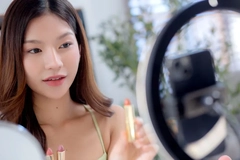“Increase supply, not prices” urges US Senator as supply chain issues continue to impact tampons
.jpg)
14 Jun 2022 --- The US is facing a nationwide tampon and sanitary pad shortage, resulting in price spikes due to supply chain issues for cotton and shortages in plastic. In a response letter to the crisis, US Senator Maggie Hassan is placing pressure on the CEOs at Procter & Gamble, Edgewell Personal Care and Kimberly-Clark – major US tampon manufacturers.
“We understand it is frustrating for consumers when they can’t find what they need. We can assure you this is a temporary situation in the US, and the Tampax team is producing tampons 24/7 to meet the increased demand for our products,” a spokesperson at Procter & Gamble, tells PersonalCareInsights.
In a letter addressed to the company, Hassan notes that tampon prices in the US have increased 10% from a year ago.

“Recently, I have seen troubling reports about low supplies and even empty shelves of tampons – as well as concerning indications that instead of increasing supply, companies have increased tampon prices.”
“Today, I am calling on CEOs of the four major tampon producers to increase supply – not prices,” she asserts.
“Cotton is a global commodity, and at the world-level the statistics do not suggest a lack of physical supply,” Jon Devine, senior economist at Cotton Incorporated, tells PersonalCareInsights.
“The US is the world’s largest exporter, representing more than one-third of global exports over the past five years. The combination of the drawdown in US exportable supply and the shipping crisis has meant that it can be more difficult for mills around the world to find cotton as easily as they normally can. This has created some scarcity and price volatility.”
Necessary steps
Hassan stresses, companies that produce tampons must take immediate action to increase the supply and end unnecessary price increases.
“Companies that produce tampons must take immediate action to increase the supply and end unnecessary price increases,” stresses Hassan. Tampon prices have increased to 10% from a year ago, says Hassan.
Tampon prices have increased to 10% from a year ago, says Hassan.
“We are working with our US retail partners to maximize availability, which has significantly increased over the last several months,” says the spokesperson.
“We’re certainly living in interesting times, where the fault lines in ‘business as usual’ are being exposed,” Kath Clements, director at menstrual cup brand Mooncup, tells PersonalCareInsights.
Cotton Incorporated shares that the nonwovens category does not require ingredient transparency. In its 2020 Global Hygiene Study, it found that 86% of consumers in China and India want more information about what is in feminine hygiene products (FHP). Mexico and Brazil at 78%, France and Italy at 67% and US, UK and Germany at 51%.
The study shows that consumers expect to find 66% of cotton, 54% of organic cotton, 18% plastic and 10% chemicals like chlorine in FHP.
Global inflation
Supply chain issues are impacting the production of sanitary pads and tampons as producers are struggling to source the raw materials needed to make sanitary products.
“The disposable sanitary product industry isn’t immune to these issues. Whether that’s issues with manufacturing workforce or supply shortages of the pesticide-rich cotton and plastic used in them,” adds Clements.
The Ukraine war has been flagged as causing a spike in prices for various types of plastic.
“The price of corn, soybeans, wheat and cotton are all near historic highs, and there is no surplus out there,” comments Morry Taylor, chairman of the board at Titan International in May. The company manufactures road tires and wheel machinery.
Hassan’s letter is reportedly part of efforts to address wider shortages and high costs. For instance, the Biden Administration invoked the Defense Production Act to address a recent critical infant formula shortage after Hassan’s push.
Profiting from basic necessity
Consumers are facing tampon shortages and high costs at major retail stores. CVS, Target and Walgreens also share that they have a limited tampon supply in certain stores. Producers are struggling to source the raw materials needed to make sanitary products.
Producers are struggling to source the raw materials needed to make sanitary products.
“Recent public reports of the tampon shortage are very troubling,” comments Hassan, “while the tampon shortage is part of a larger supply chain issue, price-spiking essential products is an unacceptable response.”
In her letter, she highlights that reports show that people see significant mark-ups months after the shortage began.
“Companies have increased prices on menstrual hygiene products, in some cases multiple times, since the shortage began. Yet they have also posted significant profits – for example, Procter & Gamble posted its biggest sales gain in decades, and the amount of money made from sales in the feminine care division went up 10%.”
“Tampons are becoming more expensive and scarcer on store shelves, and companies are profiting at record levels off a basic necessity,” she tweets, “that’s absurd.”
Equal consideration
The COVID-19 pandemic left people scrambling for essentials like toilet paper, and a similar response is needed to address the tampon shortage.
“Access to menstrual products should be treated like every other essential good. At the beginning of the pandemic, price spiking essentials like toilet paper, cleaning supplies, and hand sanitizer was rightly criticized as an exploitation of an emergency for financial gain,” writes Hassan.
“An organization that provides menstrual hygiene products for people experiencing homelessness has received half as many tampon donations as last year, leaving their warehouse nearly empty.”
Furthermore, she highlights a report saying that there have been nearly empty shelves for a few months, and big online retailers have been out of stock for weeks. “People call friends and family across state lines to see if supply is available elsewhere.”
“Throughout recent uncertainties, more and more of us have been choosing reusables. We are reclaiming our periods and choosing not to panic-buy throwaway period products from unreliable external sources,” suggests Clements as a response to this crisis.
By Venya Patel













